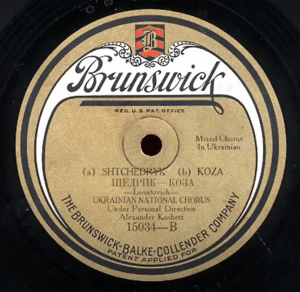Shchedryk (song) facts for kids
Quick facts for kids "Shchedryk" |
|
|---|---|

Disc label for the 1922 recording of "Shchedryk" by the Ukranian National Choir
|
|
| Song | |
| Released | 1916 |
| Songwriter(s) | Mykola Leontovych |
"Shchedryk" (Ukrainian: Щедрик) is a famous Ukrainian song. Its name comes from "Bountiful Evening" (Щедрий вечiр). In English, it's sometimes called "The Little Swallow."
A talented composer and teacher named Mykola Leontovych arranged this song in 1916. The song tells a story about a swallow bird flying into a home. The swallow sings about good fortune and wealth that will come in the spring.
"Shchedryk" was first sung on January 13. This date is New Year's Eve according to the Julian calendar, which is a different way of counting days than the one most people use today. This special evening is called Shchedry Vechir. Students at Kyiv University were among the first to perform this beautiful song.
Later, "Shchedryk" became an English Christmas carol called "Carol of the Bells". This happened after the original song was performed by Alexander Koshetz's Ukrainian National Chorus. They sang it at Carnegie Hall in New York City on October 5, 1921.
A person named Peter J. Wilhousky then wrote new lyrics for the song in English. These new words were not based on the original Ukrainian ones. He copyrighted and published his version in 1936. "Carol of the Bells" became very popular in the United States and Canada. It is now strongly connected with Christmas.
What is a Shchedrivka?
The Ukrainian lyrics of "Shchedryk" are part of a tradition called a shchedrivka. A shchedrivka is a special song sung to wish people good luck and a rich harvest for the new year.
The English song "The Little Swallow" is similar to a kolyadka. A kolyadka is another type of Ukrainian folk song, often sung around Christmas time.
History of the Song
The song "Shchedryk" comes from a very old traditional folk chant. People believed the words of this chant had magical powers. The original Ukrainian text had a special rhythm.
The main musical idea of the song uses a four-note pattern that repeats. This pattern is very old, possibly from prehistoric times. It was linked to the coming of the New Year. In Ukraine, before Christianity arrived, the New Year was celebrated in April.
When Christianity came to Ukraine, the New Year celebration moved from April to January. The holiday described in the chant became connected with the Feast of Epiphany. This holiday is also known in Ukrainian as Shchedry vechir, which falls on January 18 in the Julian calendar. Songs sung for this celebration are called Schedrivky.
The original Ukrainian words tell the story of a swallow flying into a home. It announces that the family will have a very plentiful and successful year. The song's title, "Shchedryk," comes from the Ukrainian word for "bountiful" or "generous."
Today in Ukraine, people still sing "Shchedryk" on the evening of the Julian New Year, which is January 13.
The four-note melody of the chant was used by Ukrainian composer Mykola Leontovych. He used it as a repeating theme in many of his musical arrangements. His arrangement for a choir without instruments became very famous. This happened when the Ukrainian Republic Capella, led by Oleksander Koshetz, toured Western countries after 1920.
"Carol of the Bells"
The first English lyrics for "Carol of the Bells" were written in 1936. They were created by Peter Wilhousky from NBC Radio. The song's melody made Wilhousky think of beautiful ringing bells. He used this idea in his lyrics.
There is also another English version of the original Ukrainian song by Stepan Pasicznyk. Many other English versions exist with the same melody. Most of them keep Wilhousky's bell theme. One well-known version from 1947 has more Christian-themed lyrics, called "Ring, Christmas Bells."
Even though "Carol of the Bells" and "Shchedryk" share the same melody, their lyrics are completely different.
Lyrics
Here are the Ukrainian lyrics, how they sound in English letters, and what they mean:
| Ukrainian lyrics | Transliteration (BGN/PCGN) | English translation |
|---|---|---|
|
Щедрик, щедрик, щедрівочка, |
Shchedryk, shchedryk, shchedrivochka, |
Bountiful evening, bountiful evening, a New Year's carol; |
See also
 In Spanish: Schédryk para niños
In Spanish: Schédryk para niños
 | Stephanie Wilson |
 | Charles Bolden |
 | Ronald McNair |
 | Frederick D. Gregory |


